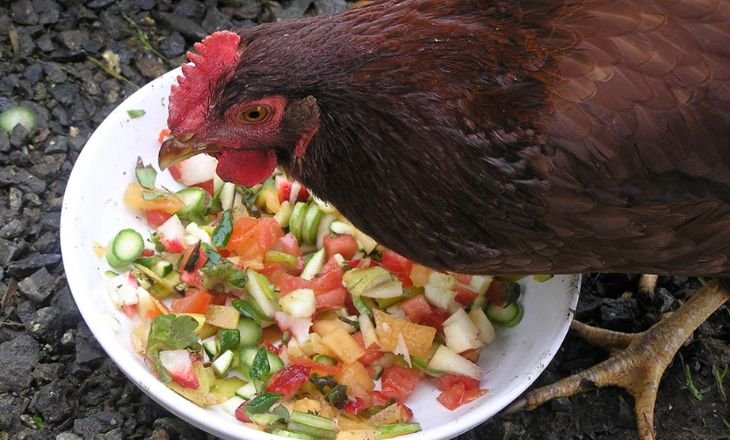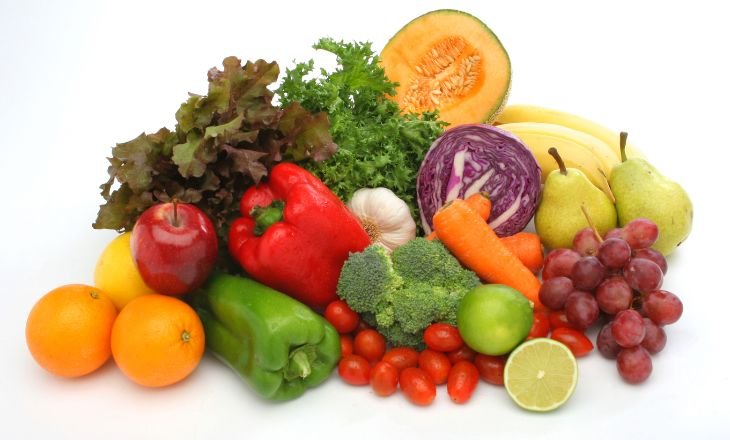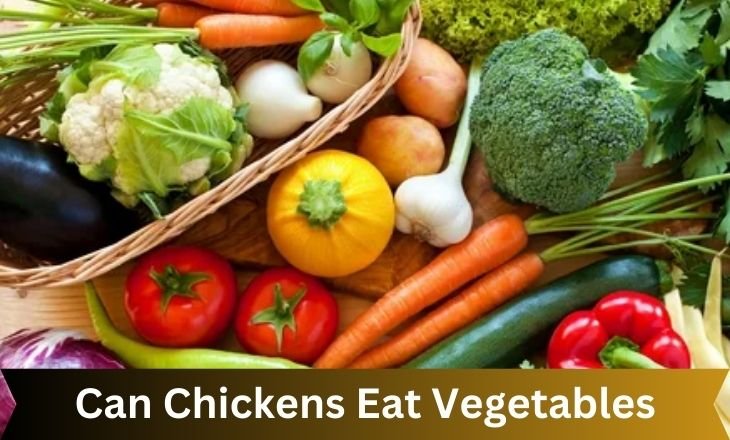Chickens usually eat grains and seeds, but do they like vegetables too? Can chickens eat vegetables? As more people raise chickens at home, they are interested in feeding them different foods. This article looks into whether chickens can eat vegetables.
Let’s find out if it’s good for them and what to consider when adding veggies to their diet.
Can Chickens Eat Vegetables And Fruits
Chickens need vegetables and fruits for nutrients and vitamins. It’s important to make sure the foods are safe for them. Most fruits and veggies are okay, but give them in small amounts to prevent stomach issues.
Leafy greens like spinach and kale are good choices because they have vitamins A and K. Berries and melons are tasty treats, but they are in moderation due to their high sugar content. Offering a variety of fruits and vegetables can improve their diet and keep them healthy.
Experiment with different options to find what your chickens enjoy while maintaining their well-being.
What Vegetables Can Chickens Eat
Chickens can eat many different foods, including vegetables. Some good vegetables for chickens are dark leafy greens like kale and spinach, which have important vitamins and minerals. Cucumbers and zucchini are also good because they keep chickens hydrated in hot weather.
But don’t give chickens raw potatoes, onion, or garlic because these can hurt their stomachs. Broccoli is mostly safe for chickens but cut it into small pieces to avoid choking.
Giving chickens a mix of vegetables helps keep them healthy and happy, and gives them a fun eating experience.
Safe Food For Chickens
Chickens need a diverse diet with vegetables to stay healthy. Vegetables provide important nutrients and help boost the birds’ immune system. Including different fresh vegetables in their diet not only improves their health but also keeps them happy and entertained.
What Can You Not Feed Chickens
Chickens enjoy eating different foods, but they should avoid certain things. Avocado pits and skins are harmful to chickens because they contain a toxic compound called persin.
Raw or dried beans can also upset chickens’ stomachs due to a toxin called hemagglutinin. It’s not good to give chickens salty or sugary snacks such as chips, cookies, or processed foods.

The Daily Ration Menu
We want to make sure our chickens eat a good mix of foods. Chickens can eat vegetables like leafy greens, carrots, and squash. It’s important to use fresh vegetables and avoid mouldy ones. Introduce new vegetables gradually so chickens can adjust. Offering a variety of vegetables can keep chickens healthy and happy.
Eating Seasonally
Feeding chickens with fresh vegetables that are in season helps them stay healthy. For instance, in the summer, giving them leafy greens like kale and spinach can provide important nutrients to keep them strong in the heat.
Spring Vegetables
Spring vegetables are good for chickens. Chickens can eat lettuce, kale, spinach, and Swiss chard. These leafy greens have important nutrients that keep chickens healthy. Chickens can also eat carrots, zucchini, and cucumbers in the spring. These vegetables give them water and important vitamins and minerals.
Butter Lettuce
In spring, you can give your chickens fresh vegetables like butter lettuce. It’s healthy and full of vitamins and minerals, and chickens enjoy it. Butter lettuce is crunchy and adds a nice flavor to your chickens’ meals.
Asparagus Vegetables
Asparagus is a great vegetable for chickens. It’s full of vitamins and minerals that chickens enjoy. Asparagus has fiber that helps with digestion. It provides important nutrients like Vitamin K, Vitamin C, and folate. Asparagus also has anti-inflammatory properties that can keep chickens healthy.
In The Summertime
In the summer, chickens enjoy eating vegetables like lettuce, cucumbers, zucchini, and tomatoes. These veggies provide vitamins and fiber that help keep chickens healthy.
Wild Lettuce
During the summer, chickens enjoy eating wild lettuce because it tastes good and has important nutrients. Chickens like to search for food and will happily eat the soft leaves of wild lettuce because they are crispy.
It’s good to check which plants are safe for your chickens, but wild lettuce can be a healthy part of their diet if given in small amounts.
Red Bell Pepper
Chickens eat a lot and like to eat different things. They usually eat commercial feed, but giving them fresh vegetables like red bell peppers is good for them.
Red bell peppers have important nutrients like Vitamin C and antioxidants, which are good for chickens.
English Cucumber
Chickens enjoy eating English cucumbers in the summer to stay cool and hydrated. Cucumbers are crunchy and juicy, making them a nutritious snack that keeps chickens healthy and energized in the sun.
Summer Squash
Chickens like to eat summer squash in the warm months. They enjoy pecking at and eating the soft flesh of the squash, which is nutritious and tasty for them. Summer squash has vitamins and minerals like vitamin C and potassium that help keep chickens healthy.
Wintertime
During winter, chicken owners may wonder which vegetables are safe for their chickens. Despite some vegetables being less available in winter, there are still many nutritious options. Leafy greens such as kale and spinach are rich in vitamins and minerals, making them a good choice for chickens even in cold weather.
Parsnips
In winter, parsnips are a good snack for chickens. They have vitamins, minerals, and antioxidants that can boost the chickens’ immune system and give them energy to stay warm.
Adding parsnips to chickens’ diets can provide variety and keep them interested. You can cook parsnips before giving them to your chickens to make them tastier.
Dark Leafy Greens
During winter, chickens need dark leafy greens in their diet. These greens give them important nutrients like vitamin A and calcium. They also help keep the chickens warm in the cold. Chickens can eat different dark leafy greens like kale, collard greens, and Swiss chard to add variety and nutrition to their diet.
Fall Vegetables
In the fall, your garden may look empty, but there are still good vegetables for your chickens. Some safe and healthy options include Brussels sprouts, carrots, and kale.

These veggies have important nutrients that can keep your chickens well in the colder months. Remember to give them a variety of vegetables in moderation to keep their diet balanced.
Chicken Eat Carrots
During snowy weather when there’s not much fresh food for chickens, owners often wonder what vegetables are safe to feed them. Carrots are a good choice because they have important nutrients like vitamin A and fiber, and can help keep chickens hydrated in the cold. Chickens can eat carrots raw or cooked, making it a versatile and tasty treat for them.
Sunflower Seeds
Sunflower seeds are a healthy snack for chickens, providing fats and proteins to keep them warm and healthy in cold weather. Chickens like pecking at the seeds, which can help stimulate their natural foraging instincts.
Onions And Garlic
Onions and garlic are good for chickens. They give important nutrients and can help boost the immune system in cold weather. Onions have natural antibacterial properties that can help prevent illnesses in winter.
It’s important to feed onions and garlic in moderation to avoid digestive problems like upset stomachs or diarrhoea in chickens. Some experts recommend cooking onions and garlic before giving them to chickens to make them easier to digest while keeping their benefits.
Conclusion
Chickens can indeed eat a variety of vegetables as part of a well-balanced diet. Vegetables provide important nutrients and vitamins for chickens, contributing to their overall health and well-being. It is essential to introduce vegetables gradually into their diet and monitor for any adverse reactions.
By incorporating a diverse range of vegetables into their meals, chicken owners can ensure that their feathered friends are receiving the necessary nutrition they need to thrive. So go ahead, experiment with different veggies and watch your chickens enjoy their nutritious treats!
Frequently Asked Question
Can Chickens Eat Raw Vegetables?
Chickens can eat many raw vegetables, but they should avoid starchy root vegetables and dried beans. Potatoes, sweet potatoes, and dried beans can be harmful to chickens if not cooked.
Raw vegetables are healthy for chickens because they have more nutrients and enzymes.

